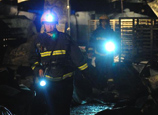
Three major industrial accidents; more than 100 deaths.
Most tragically a fire at the poultry processing plant in Dehui, Jilin province killed at least 119 people on Monday. The other two accidents were a fire at a grain depot in Heilongjiang province on Friday and an explosion at a petrochemical plant in Dalian, Liaoning province on Sunday, which inflicted heavy economic losses.
The accidents happened within a week of each other and bring home the harsh reality that China has much to do to improve workplace safety.
Although the causes are yet to be determined, the ignoring of workplace safety rules contributed to the high death toll. According to Monday's survivors, some of the exits at the slaughterhouse remained locked when workers tried to escape.
While extending our condolences to families of those that died, we urge the relevant government departments to investigate the accidents promptly and publicize the causes, and if any irregularities are discovered, those responsible must be held accountable in accordance with law.
In April, the Jilin authorities carried out a province-wide work-safety check that lasted one month. It is discomforting and thought provoking that the check-up still failed to prevent Monday's accident.
Although the number of deaths as a result of workplace accidents has been on the decline in the past decade, as the authorities have strengthened implementation of workplace safety standards in mines and industrial enterprises, people die every day in accidents at work nationwide.
Since it is a matter of life and death, the nation must draw the necessary lessons from these accidents, the regulators must do a better job in plugging potential loopholes, and the management must more faithfully implement the work-safety rules.
The public should also be invited to supervise workplace safety. Social networking tools, such as micro blogs, can play a constructive role in pressuring management to improve their workplace safety.


















![]()
